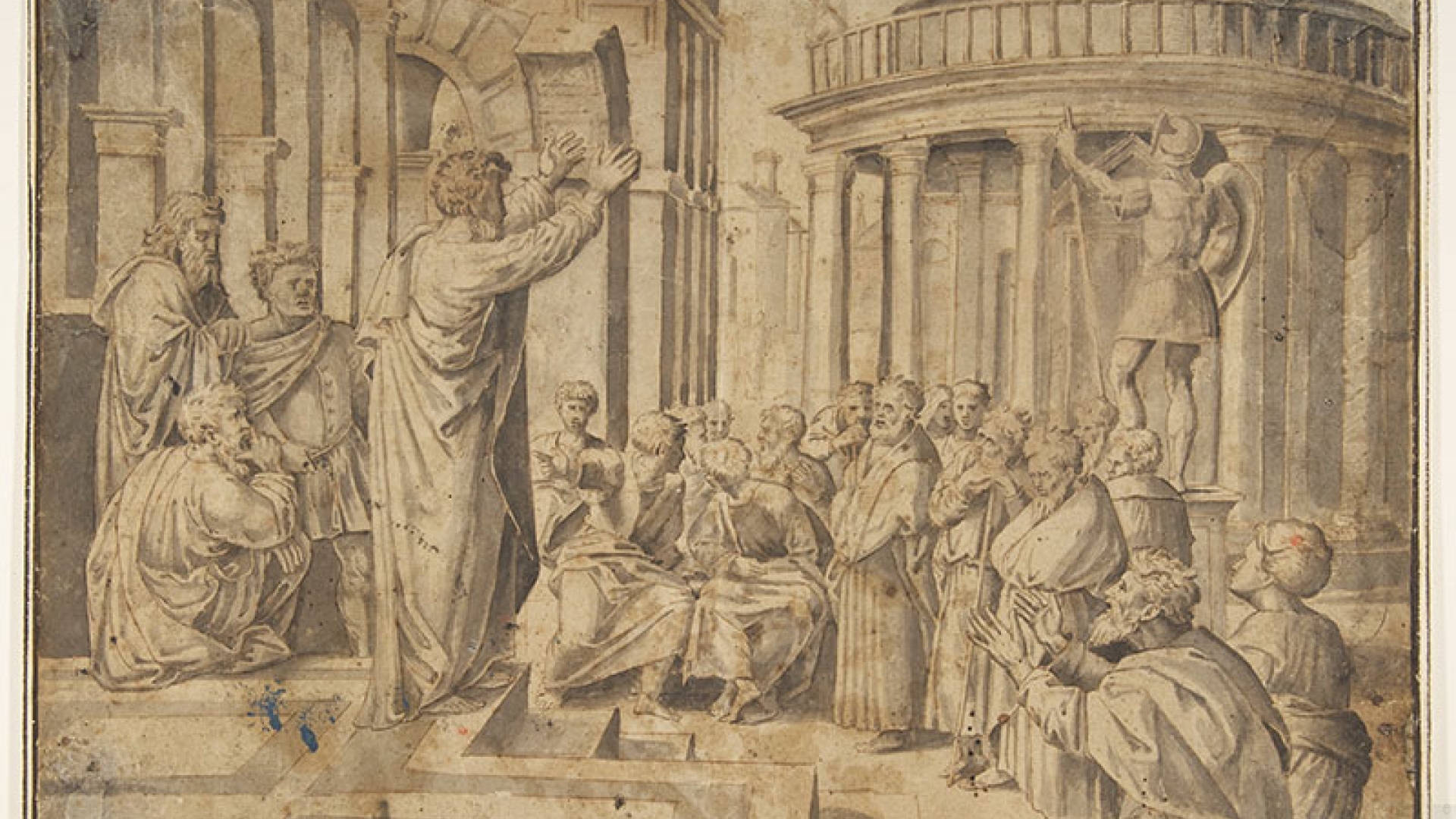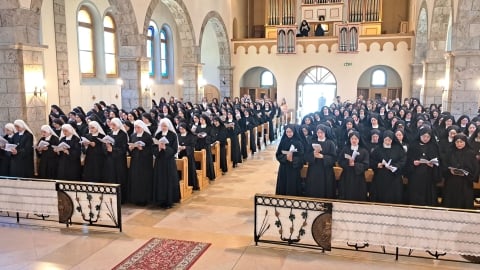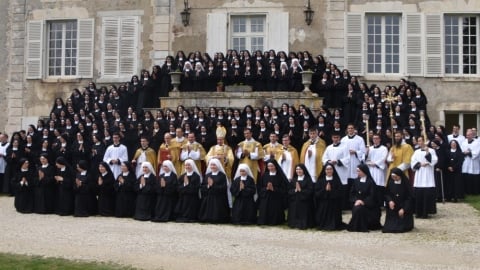The Didache: Teachers, Apostles, and Prophets

After Raphael: St. Paul preaching at Athens
The Didache, sometimes called “The Lord's Teaching Through the Twelve Apostles to the Nations” in reference to its opening line, is a first-century document governing Church order and is one of the oldest catechetical texts in Christendom. This fourth installment of a five-part series on the Didache sets forth how traveling apostles, prophets, and fellow Christians should be treated by the local community and what precautions must be taken.
Read Part 3: "The Didache: Baptism, Prayer, and the Eucharist"
Read Part 2: "The Didache: The Two Ways"
Read Part 1: "The Didache: Introduction, Origin, and Rediscovery"
Concerning Those Who Teach
Chapter 11 of the Didache is the longest of those under consideration here. It focuses on three “classifications” of teachers who may come to the community under different banners of authority. The first, generically referred to as “teachers,” appear to be outsiders who arrive for the purposes of instructing the faithful. A recurrent theme of this portion of the Didache is caution when it comes to those from outside of the community (11:1-2):
Whosoever, therefore, comes and teaches you all these things that have been said before, receive him. But if the teacher himself turn and teach another doctrine to the destruction of this, hear him not; but if he teach so as to increase righteousness and the knowledge of the Lord, receive him as the Lord.
That is, the community should evaluate an arriving teacher against the catechetical instructions already set forth in the Didache. If the teacher’s words align with the text, “receive him”; but if the teacher delivers another doctrine that undermines (or seeks to destroy) the doctrine of the Didache, “hear him not.” This fundamental measuring stick is one Catholics must still use today when faced with “teachers” from within the Church who preach doctrines contrary to those which have been received.
As for the next category, namely apostles, the text exhorts the faithful to “[l]et every apostle that comes to you be received as the Lord” (11:4), but one who overstays his welcome (three days or more) or asks for money “is a false prophet” or teacher (11:5-6).
This portion of the Didache may very well have been written before the deaths of the original Apostles and at a time when others bearing this title had been sent forth to evangelize. Without anything like a centralized registry of those authorized by the Church to preach the Gospel, the Didache establishes a basic set of parameters for knowing whose word should be accepted and who should be turned away. Those seeking their own personal comfort through extended free lodging, or the reception of money, are clearly identified as false.
As for those designated as prophets, the Didache provides more detailed guidelines (11:7-12):
And every prophet that speaks in the Spirit you shall neither try nor judge; for every sin shall be forgiven, but this sin shall not be forgiven. But not every one that speaks in the Spirit is a prophet; but only if he hold the ways of the Lord. Therefore, from their ways shall the false prophet and the prophet be known. And every prophet who orders a meal in the Spirit eats not from it, except indeed he be a false prophet; and every prophet who teaches the truth, if he do not what he teaches, is a false prophet. And every prophet, proved true, working unto the mystery of the Church in the world, yet not teaching others to do what he himself does, shall not be judged among you, for with God he has his judgment; for so did also the ancient prophets. But whoever says in the Spirit, Give me money, or something else, you shall not listen to him; but if he says to you to give for others' sake who are in need, let no one judge him.
With nearly two millennia’s distance between the composition of the Didache and today, it is no longer clear who these “prophets” the text speaks of were. According to Church teaching, the final prophet of the Old Covenant before the arrival of Jesus Christ is John the Baptist. It is likely the prophets spoken of in the Didache refer to a special class of itinerant preachers, with some textual evidence suggesting they may have been priests (cf. 13:3). There is no evidence in the text, however, that these teachers came delivering a new or expanded revelation past what was delivered by the Apostles and concluded with the death of St. John the Evangelist around 95 AD.
Like the other teachers spoken of in Chapter 11, the faithful are provided a criterion to assess prophets. If their words contradict received teaching or their actions are contrary to the ways of the Lord, then they are false. Some have sensed a tension in the text insofar as the faithful are warned initially not to judge or test a prophet, though as the chapter explains further, this is only if he “speaks in the Spirit” and in so speaking also “holds the ways of the Lord.” There is no demand for the faithful to be naive or ignore contradictions between what a prophet says or does and what the faithful know to be correct based on the teachings they have received from the Church.
The Reception of Traveling Christians
The next chapter, which is considerably shorter than Chapter 11, deals with traveling Christians who arrive in an established community. While they should be greeted warmly by the community, prudence must also be exercised.
But let every one that comes in the name of the Lord be received, and afterward you shall prove and know him; for you shall have understanding right and left. If he who comes is a wayfarer, assist him as far as you are able; but he shall not remain with you, except for two or three days, if need be. But if he wills to abide with you, being an artisan, let him work and eat; but if he has no trade, according to your understanding see to it that, as a Christian, he shall not live with you idle. But if he wills not to do, he is a Christ-monger. Watch that you keep aloof from such.
This is sensible. Those who arrive wishing to join and contribute to the community should be welcomed to stay. Visitors should be received and then sent on their way. For those who wish to stay but have no trade or skills, they may stay, but they should not be idle. Christians are not called to be gullible; they can still assess others for the good of the community without sacrificing charity.
Special attention should be given to the final verse in this chapter as it is sometimes a source of confusion. Regarding a person that “wills not to do,” this has been taken to mean either an unwillingness to work, that is, “to do” on behalf of the community, or “to do” what the precepts of Christianity call for generally. This verse also contains the neologism χριστέμπρός, translated above as “Christ-monger,” but more helpfully unpacked as referring to those who exploit the name of Christ for their own living or profit. Later deployment of the term in the works of Ss. Athanasius, Basil, Gregory Nazianzus, and John Chrysostom refer to “Christ-sellers” or those who abuse Christianity for pecuniary gain. Lamentably, such persons still exist within the Church to this very day.
Supporting the Prophets
The Didache’s chapters devoted to teachers, prophets, and apostles closes with an exhortation in Chapter 13 to distribute the community’s first fruits to the prophets “for they are your high priests” (13:3) or, if there are none, to the poor (13:4). Money, clothing, and other possessions should also, based on personal judgment in the light of Christian precepts, be given to the prophets as well (13:6-7). Chapter 13 must, of course, be read in conjunction with Chapter 11 lest the community be taken advantage of by false teachers.
Although today’s cultural context is in many ways radically different from that of the early Church, the presence of false teachers and those who would twist the Faith for their own advantage is a perennial problem. Lacking convenient modes of communication, early Christian communities were at risk of being leveraged by unscrupulous persons in the name of Christ. It is incorrect, however, to assume that the contemporary Church has overcome those threats through the rapid dissemination of information and the availability of catechetical materials. While the means of instilling the Gospel are there, the willingness to do so is lacking in many parts of the Church. Moreover, those who are hungry for the Truth are often susceptible to being misled by pseudo-apostles and self-anointed online prophets offering an “unadulterated Gospel”—for a price.
sspx.org - 11/02/2023





